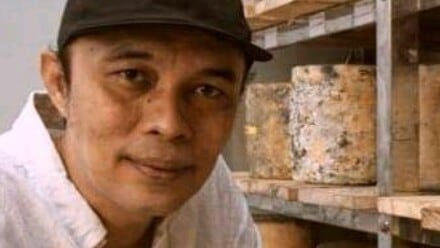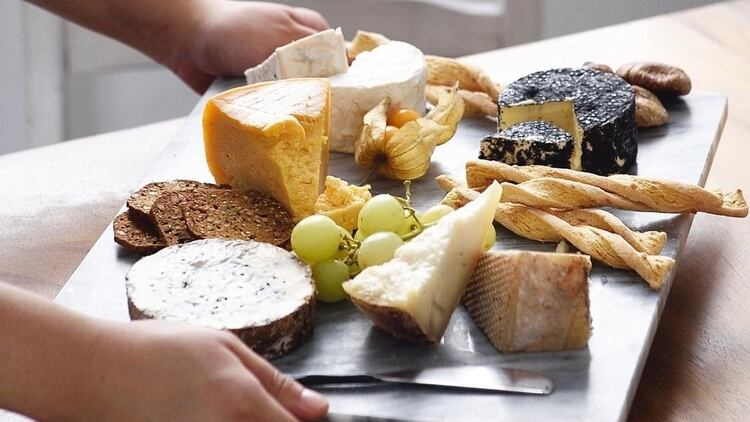According to the founder of Yogyakarta-based firm PT Mazaraat Lokanatura, Jamie Najmi, 46, the second factory will be located near the first – both are near the foot of Indonesia’s most active volcano, Mount Merapi, in Yogyakarta (Central Java island). The second factory, built by investments from Jakarta, could process another 3,000 litres of milk. It will supplement the first factory, which has a capacity of 1,000 litres.
A total of 100kg of cheese could be produced from 1,000 litres of milk. Hence, the output could be quadrupled with a total projected capacity of 4,000 litres daily.
With the increased output, he intends to distribute the cheeses to more countries in South East Asia, like Malaysia, the Philippines, Thailand, Vietnam and Cambodia, in 2023, and Japan and beyond by 2024.

Jamie, a New Zealand and France-certified cheese master, said: “We want to expand in South East Asia first and started with Singapore as our distribution hub in February 2022. From Singapore, we can enter other South East Asian nations by Q2 2023. The first factory will be converted into our research and development (R&D) site to develop more signature cheeses, while the second factory will be our production line and planned to commence operations in February 2023”.
Not ‘cheesy’ to build
Established in late November 2015, PT Mazaraat Lokanatura Indonesia started by managing 20 litres a day and then increased to 50 litres to produce approximately five kilogrammes of cheese daily. He claimed that each batch did not contain preservatives, additives, artificial flavour, synthetic food colouring and GMO ingredients.
Mazaraat works with 35 to 40 local farmers who own 300 cows at Merapi. The factories are also located within three minutes from their farms; therefore, there is no overnight transportation of raw milk. The cattle in these farms are also bred in the most natural manner possible and grass-fed, without the need for antibiotics and unnecessary treatment.
Overall, the firm manufactures 18 SKUs in fresh and aged cheese, and creamery categories. Among its top sellers include perennial crowd-pleasers halloumi, mozzarella and Colby Jack. It has also produced France’s Tomme de Savoie named Tomme de Merapi and the Fourme d’Ambert blue cheese called Ibra. A version of the Brillat-Savarin (camembert) called Athan and its take on Switzerland’s Swiss Appenzeller called Alpine were also introduced to the market. Under the creamery category, the firm produces products such as crème fraiche, cultured butter beurre blanc and ghee.
All the SKUs are certified halal by Indonesian Islamic authority, the Indonesian Ulema Council (MUI). The certification is a feat in itself because halal animal-based rennet is difficult to procure. The kid or calf has to be slaughtered according to Islamic principles, said Jamie.
The company’s touchpoints in Indonesia include its WhatsApp, Instagram and website, besides conventional supermarkets like Grand Lucky and Growell and online organic health shops.
“We started this not because of the money. In the beginning, we only had 20 litres of milk crafted over three days. During an event in Ubud, Bali, we met a Belgian woman who has stayed there for 15 years. She burst into tears upon tasting our artisanal cheese. She said it reminded her of home. For us, the consumers’ appreciation of the product is worth more than any financial reward,” he said.
Not ‘cheesy’ to scale
Since the firm practises cheesemaking by hand, scaling up is challenging.
In conventional industrial methods, manufacturers need to adjust only the ingredients. But in the field of handcrafted cheese as practised by Jamie, producers have to adjust the whole process and note the difference in milk quality daily.
“When it rains or expressing milk in the mornings, its qualities are different than the milk at other timings. To scale, we need to monitor the temperatures and times carefully. The process differs according to the milk we receive on that particular day,” he said.
Despite facing these challenges, Jamie has set his sights on scaling up as he wants as many people to enjoy the cheese experience as possible.
“Hopefully, the farmers could also supply more milk and of higher quality, so we can provide the cheese at better prices,” concluded Jamie.
Proteins, healthy ageing and probiotics are major focus areas of our upcoming Growth Asia Summit in Singapore from 11 to 13 October. Check out big-name brands, international experts and pioneering start-ups slated to present here.

